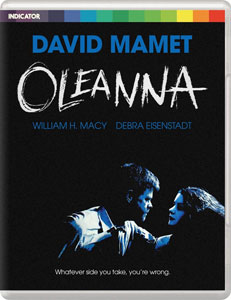“Oleanna” (1994) might be writer-director David Mamet’s most divisive film. It examines the important issue of whether college should still be a revered institution, but it’s also hard to watch at times, as it’s essentially a 90-minute awkward-conversation-turned-argument between professor John (William H. Macy) and student Carol (Debra Eisenstadt).
It presents points of view that will likely get viewers’ blood boiling, especially when Carol flips the script and starts lecturing her teacher on how to behave – while she’s backed by the very institution that had afforded John a career doing what he loves.
Points of division
While Macy shines, another point of division – even in my own mind – is Eisenstadt’s performance. Carol is annoying, but Mamet intends her to be. In her screen debut, Eisenstadt comes off as an inexperienced actress, but it serves the movie well because Carol is uncomfortable conversing with her professor in his office.

“Oleanna” (1994)
Director: David Mamet
Writer: David Mamet
Stars: William H. Macy, Debra Eisenstadt, Diego Pineda
I can’t say she’s good in the role by any means, but by the same token, Eisenstadt doesn’t step on Macy’s toes any more than the screenplay asks her to. Mamet intends this to be a jittery, awkward interplay in order to illustrate how different these two people are, even though John initially thinks Carol is similar to himself.
Showing that Mamet was on the leading edge of the arc of history, “Oleanna” – based on his 1992 play — ultimately deals with an issue that has been all over the news in the current decade: people in power being accused of sexual misconduct, with the accuser often backed – formally or informally – by a movement whose foremost concern is not the facts of the specific case.
Carol speaks of her “group,” which has advised her to take legal action against John. The ephemeral off-screen “group” and all it stands for is supposed to be annoying to John and the viewer, and it is.
Carol is not merely a student in an inferior position to the powerful professor, but she’s also dimwitted to the point of having a learning disability. This is a strange choice by Mamet, because the film’s gender and power politics could be explored with Carol having a high level of intelligence.
Purposely flawed characters
“Oleanna” begins with Carol visiting John’s office to discuss her bad grade and her admitted inability to absorb anything he says in class. She explodes at him when he says he’s going to pull up statistics about job prospects for college students from 1850 to 1980, yelling that she can’t understand that stuff.
That’s not to say Mamet – who has experience in the collegiate world, as he sometimes works as an adjunct professor – is a big fan of John, either. The bulk of the film is concerned with the question of whether college is a universal good – and if some people (like Carol) aren’t suited for college, if that’s necessarily a bad thing.

Despite mostly taking place in John’s office, and featuring words more than physicality, “Oleanna” is intensely dramatic. So a humorous irony could be overlooked: John teaches a class on educational theory, and his personal theory is that the American education system is garbage. He’s in the process of buying a house, and he wonders aloud about the fairness of having to pay school taxes to prop up a system he might not believe in.
But he himself is employed by a school. (It’s not clear whether this college is at all state-funded, but even if it’s not, we know how government tuition subsidies have artificially raised tuition rates.) John is a teacher because he loves it, and I don’t think there’s anything wrong with his questioning of the institution that employs him; he’s right when he tells Carol his job is to make her think, not to list facts that she will then spout back. But the irony, and John’s hypocrisy, remains.
“Oleanna’s” dramatic conclusion, wherein Carol brings John up on charges before his bosses, is hampered by Carol’s portrayal as someone unable to absorb information and ideas. She is spouting group-think, yet she does make good points (if we examine them in a vacuum) about how her experience is different from John’s. When John grabs her by the shoulders, he does not intend it as a sexual advance. She sees it as one. Is that less valid than his point of view? If so, why?
Same situation, wildly different perspectives
This illustrates how two people’s perspectives can be wildly different, and the folly of anyone (the two participants, or an outside panel) trying to objectively judge what happened.
This is a fascinating concept, and it’s too bad it’s undercut by “Oleanna” having made it clear that Carol is a hopeless student who has been co-opted by her “group,” and that she’s so off the mark on her interpretation of this specific case. Grabbing a student by the shoulders might not be right of the professor, but if it’s rape, that demeans real rape victims.
“Oleanna” clearly views John as the victim in the John-versus-Carol clash, and it might’ve been a more interesting film if it had balanced the two sides rather than making Carol a cartoon. But at the same time, Mamet makes a broader point: Perhaps the whole American education system (including independent colleges) has overstayed its usefulness if it can produce absurdist scenarios such as this one – which we’ve since seen mirrored in the real world.

